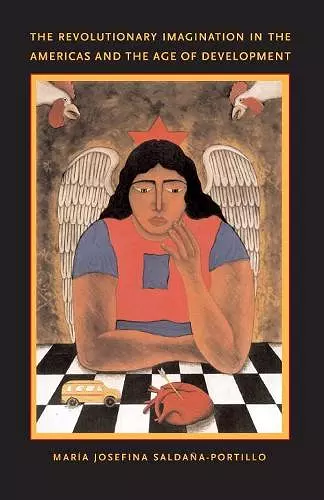The Revolutionary Imagination in the Americas and the Age of Development
María Josefina Saldaña-Portillo author
Format:Paperback
Publisher:Duke University Press
Published:7th Nov '03
Currently unavailable, and unfortunately no date known when it will be back

Explores the dependence of revolutionary movements in the Americas on the discourse of development.
Argues that crucial twentieth-century revolutionary challenges to colonialism and capitalism in the Americas have failed to resist - and in fact have been constitutively related to - the very developmentalist narratives that have justified and naturalized post-war capitalism.In The Revolutionary Imagination in the Americas and the Age of Development, María Josefina Saldaña-Portillo boldly argues that crucial twentieth-century revolutionary challenges to colonialism and capitalism in the Americas have failed to resist—and in fact have been constitutively related to—the very developmentalist narratives that have justified and naturalized postwar capitalism. Saldaña-Portillo brings the critique of development discourse to bear on such exemplars of revolutionary and resistant political thought and practice as Ernesto “Che” Guevara, Malcolm X, the Sandinista government of Nicaragua, and the Guatemalan guerrilla resistance. She suggests that for each of these, developmentalist constructions frame the struggle as a heroic movement from unconsciousness to consciousness, from a childlike backwardness toward a disciplined and self-aware maturity.
Reading governmental reports, memos, and policies, Saldaña-Portillo traces the arc of development narratives from its beginnings in the 1944 Bretton Woods conference through its apex during Robert S. McNamara's reign at the World Bank (1968–1981). She compares these narratives with models of subjectivity and agency embedded in the autobiographical texts of three revolutionary icons of the 1960s and 1970s—those of Che Guevara, Guatemalan insurgent Mario Payeras, and Malcolm X—and the agricultural policy of the Sandinista National Liberation Front (FSLN). Saldaña-Portillo highlights a shared paradigm of a masculinist transformation of the individual requiring the "transcendence" of ethnic particularity for the good of the nation. While she argues that this model of progress often alienated the very communities targeted by the revolutionaries, she shows how contemporary insurgents such as Rigoberta Menchú, the Zapatista movement, and queer Aztlán have taken up the radicalism of their predecessors to retheorize revolutionary subjectivity for the twenty-first century.
“This is an important and strikingly original work on a topic of enormous contemporary importance. By bringing disparate phenomena together and insisting that they may all be analyzed as examples of the unexamined perpetuation of developmentalist narratives in discourses and practices of resistance in the Americas, María Josefina Saldaña-Portillo allows a fresh light to be shed on what appeared to be well-trodden ground.”—James Ferguson, coeditor of Culture, Power, Place: Explorations in Critical Anthropology
"María Josefina Saldaña-Portillo takes discourse studies where it needs to go and where few humanists are able to take it: toward an effective interfacing with political economy and ethnography. The Revolutionary Imagination in the Americas and the Age of Development sits at the center of the hemispheric paradigm that has been emerging in American Studies. Saldaña-Portillo is one of the key new architects of that paradigm."—Mary Louise Pratt, author of Imperial Eyes: Travel Writing and Transculturation
ISBN: 9780822331667
Dimensions: unknown
Weight: 526g
384 pages